- Home
- Barbara Kingsolver
Animal, Vegetable, Miracle: A Year of Food Life
Animal, Vegetable, Miracle: A Year of Food Life Read online
ANIMAL, VEGETABLE, MIRACLE
A Year of Food Life
BARBARA KINGSOLVER
with Steven L. Hopp and Camille Kingsolver
ORIGINAL DRAWINGS BY RICHARD A. HOUSER
Dedication
In memory of Jo Ellen
CONTENTS
Dedication
1. Called Home
2. Waiting for Asparagus: Late March
3. Springing Forward
4. Stalking the Vegetannual
5. Molly Mooching: April
6. The Birds and the Bees
7. Gratitude: May
8. Growing Trust: Mid-June
9. Six Impossible Things Before Breakfast: Late June
10. Eating Neighborly: Late June
11. Slow Food Nations: Late June
12. Zucchini Larceny: July
13. Life in a Red State: August
14. You Can't Run Away on Harvest Day: September
15. Where Fish Wear Crowns: September
16. Smashing Pumpkins: October
17. Celebration Days: November-December
18. What Do You Eat in January?
19. Hungry Month: February-March
20. Time Begins
Acknowledgments
References
Organizations
Sidebar Resources
About the Authors
Books by Barbara Kingsolver
Credits
Copyright
About the Publisher
"Picture a single imaginary plant, bearing throughout one season all the different vegetables we harvest...we'll call it a vegetannual."
1 * CALLED HOME
This story about good food begins in a quick-stop convenience market. It was our family's last day in Arizona, where I'd lived half my life and raised two kids for the whole of theirs. Now we were moving away forever, taking our nostalgic inventory of the things we would never see again: the bush where the roadrunner built a nest and fed lizards to her weird-looking babies; the tree Camille crashed into learning to ride a bike; the exact spot where Lily touched a dead snake. Our driveway was just the first tributary on a memory river sweeping us out.
One person's picture postcard is someone else's normal. This was the landscape whose every face we knew: giant saguaro cacti, coyotes, mountains, the wicked sun reflecting off bare gravel. We were leaving it now in one of its uglier moments, which made good-bye easier, but also seemed like a cheap shot--like ending a romance right when your partner has really bad bed hair. The desert that day looked like a nasty case of prickly heat caught in a long, naked wince.
This was the end of May. Our rainfall since Thanksgiving had measured less than one inch. The cacti, denizens of deprivation, looked ready to pull up roots and hitch a ride out if they could. The prickly pears waved good-bye with puckered, grayish pads. The tall, dehydrated saguaros stood around all teetery and sucked-in like very prickly supermodels. Even in the best of times desert creatures live on the edge of survival, getting by mostly on vapor and their own life savings. Now, as the southerntier of U.S. states came into a third consecutive year of drought, people elsewhere debated how seriously they should take global warming. We were staring it in the face.
Away went our little family, like rats leaping off the burning ship. It hurt to think about everything at once: our friends, our desert, old home, new home. We felt giddy and tragic as we pulled up at a little gas-and-go market on the outside edge of Tucson. Before we set off to seek our fortunes we had to gas up, of course, and buy snacks for the road. We did have a cooler in the back seat packed with respectable lunch fare. But we had more than two thousand miles to go. Before we crossed a few state lines we'd need to give our car a salt treatment and indulge in some things that go crunch.
This was the trip of our lives. We were ending our existence outside the city limits of Tucson, Arizona, to begin a rural one in southern Appalachia. We'd sold our house and stuffed the car with the most crucial things: birth certificates, books-on-tape, and a dog on drugs. (Just for the trip, I swear.) All other stuff would come in the moving van. For better or worse, we would soon be living on a farm.
For twenty years Steven had owned a piece of land in the southern Appalachians with a farmhouse, barn, orchards and fields, and a tax zoning known as "farm use." He was living there when I met him, teaching college and fixing up his old house one salvaged window at a time. I'd come as a visiting writer, recently divorced, with something of a fixer-upper life. We proceeded to wreck our agendas in the predictable fashion by falling in love. My young daughter and I were attached to our community in Tucson; Steven was just as attached to his own green pastures and the birdsong chorus of deciduous eastern woodlands. My father-in-law to be, upon hearing the exciting news about us, asked Steven, "Couldn't you find one closer?"
Apparently not. We held on to the farm by renting the farmhouse to another family, and maintained marital happiness by migrating like birds: for the school year we lived in Tucson, but every summer headed back to our rich foraging grounds, the farm. For three months a year we lived in a tiny, extremely crooked log cabin in the woods behind the farmhouse, listening to wood thrushes, growing our own food. The girls (for another child came along shortly) loved playing in the creek, catching turtles, experiencing real mud. I liked working the land, and increasingly came to think of this place as my home too. When all of us were ready, we decided, we'd go there for keeps.
We had many conventional reasons for relocation, including extended family. My Kingsolver ancestors came from that county in Virginia; I'd grown up only a few hours away, over the Kentucky line. Returning now would allow my kids more than just a hit-and-run, holiday acquaintance with grandparents and cousins. In my adult life I'd hardly shared a phone book with anyone else using my last name. Now I could spend Memorial Day decorating my ancestors' graves with peonies from my backyard. Tucson had opened my eyes to the world and given me a writing career, legions of friends, and a taste for the sensory extravagance of red hot chiles and five-alarm sunsets. But after twenty-five years in the desert, I'd been called home.
There is another reason the move felt right to us, and it's the purview of this book. We wanted to live in a place that could feed us: where rain falls, crops grow, and drinking water bubbles right up out of the ground. This might seem an abstract reason for leaving beloved friends and one of the most idyllic destination cities in the United States. But it was real to us. As it closes in on the million-souls mark, Tucson's charms have made it one of this country's fastest-growing cities. It keeps its people serviced across the wide, wide spectrum of daily human wants, with its banks, shops, symphonies, colleges, art galleries, city parks, and more golf courses than you can shake a stick at. By all accounts it's a bountiful source of everything on the human-need checklist, save for just the one thing--the stuff we put in our mouths every few hours to keep us alive. Like many other modern U.S. cities, it might as well be a space station where human sustenance is concerned. Virtually every unit of food consumed there moves into town in a refrigerated module from somewhere far away. Every ounce of the city's drinking, washing, and goldfish-bowl-filling water is pumped from a nonrenewable source--a fossil aquifer that is dropping so fast, sometimes the ground crumbles. In a more recent development, some city water now arrives via a three-hundred-mile-long open canal across the desert from the Colorado River, which--owing to our thirsts--is a river that no longer reaches the ocean, but peters out in a sand flat near the Mexican border.
If it crosses your mind that water running through hundreds of miles of open ditch in a desert will evaporate and end up full of concentrated salts and mu
ck, then let me just tell you, that kind of negative thinking will never get you elected to public office in the state of Arizona. When this giant new tap turned on, developers drew up plans to roll pink stucco subdivisions across the desert in all directions. The rest of us were supposed to rejoice as the new flow rushed into our pipes, even as the city warned us this water was kind of special. They said it was okay to drink, but don't put it in an aquarium because it would kill the fish.
Drink it we did, then, filled our coffee makers too, and mixed our children's juice concentrate with fluid that would gag a guppy. Oh, America the Beautiful, where are our standards? How did Europeans, ancestral cultures to most of us, whose average crowded country would fit inside one of our national parks, somehow hoard the market share of Beautiful? They'll run over a McDonald's with a bulldozer because it threatens the way of life of their fine cheeses. They have international trade hissy fits when we try to slip modified genes into their bread. They get their favorite ham from Parma, Italy, along with a favorite cheese, knowing these foods are linked in an ancient connection the farmers have crafted between the milk and the hogs. Oh. We were thinking Parmesan meant, not "coming from Parma," but "coming from a green shaker can." Did they kick us out for bad taste?
No, it was mostly for vagrancy, poverty, or being too religious. We came here for the freedom to make a Leaves of Grass kind of culture and hear America singing to a good beat, pierce our navels as needed, and eat whatever we want without some drudge scolding: "You don't know where that's been!" And boy howdy, we do not.
The average food item on a U.S. grocery shelf has traveled farther than most families go on their annual vacations. True fact. Fossil fuels were consumed for the food's transport, refrigeration, and processing, with the obvious environmental consequences. The option of getting our household's food from closer to home, in Tucson, seemed no better to us. The Sonoran desert historically offered to humans baked dirt as a construction material, and for eats, a corn-and-beans diet organized around late summer monsoons, garnished in spring with cactus fruits and wild tubers. The Hohokam and Pima were the last people to live on that land without creating an environmental overdraft. When the Spaniards arrived, they didn't rush to take up the Hohokam diet craze. Instead they set about working up a monumental debt: planting orange trees and alfalfa, digging wells for irrigation, withdrawing millions more gallons from the water table each year than a dozen inches of annual rainfall could ever restore. Arizona is still an agricultural state. Even after the population boom of the mid-nineties, 85 percent of the state's water still went to thirsty crops like cotton, alfalfa, citrus, and pecan trees. Mild winters offer the opportunity to create an artificial endless summer, as long as we can conjure up water and sustain a chemically induced illusion of topsoil.
Oily Food
* * *
Americans put almost as much fossil fuel into our refrigerators as our cars. We're consuming about 400 gallons of oil a year per citizen--about 17 percent of our nation's energy use--for agriculture, a close second to our vehicular use. Tractors, combines, harvesters, irrigation, sprayers, tillers, balers, and other equipment all use petroleum. Even bigger gas guzzlers on the farm are not the machines, but so-called inputs. Synthetic fertilizers, pesticides, and herbicides use oil and natural gas as their starting materials, and in their manufacturing. More than a quarter of all farming energy goes into synthetic fertilizers.
But getting the crop from seed to harvest takes only one-fifth of the total oil used for our food. The lion's share is consumed during the trip from the farm to your plate. Each food item in a typical U.S. meal has traveled an average of 1,500 miles. In addition to direct transport, other fuel-thirsty steps include processing (drying, milling, cutting, sorting, baking), packaging, warehousing, and refrigeration. Energy calories consumed by production, packaging, and shipping far outweigh the energy calories we receive from the food.
A quick way to improve food-related fuel economy would be to buy a quart of motor oil and drink it. More palatable options are available. If every U.S. citizen ate just one meal a week (any meal) composed of locally and organically raised meats and produce, we would reduce our country's oil consumption by over 1.1 million barrels of oil every week. That's not gallons, but barrels. Small changes in buying habits can make big differences. Becoming a less energy-dependent nation may just need to start with a good breakfast.
* * *
STEVEN L. HOPP
Living in Arizona on borrowed water made me nervous. We belonged to a far-flung little community of erstwhile Tucson homesteaders, raising chickens in our yards and patches of vegetables for our own use, frequenting farmers' markets to buy from Arizona farmers, trying to reduce the miles-per-gallon quotient of our diets in a gasoholic world. But these gardens of ours had a drinking problem. So did Arizona farms. That's a devil of a choice: Rob Mexico's water or guzzle Saudi Arabia's gas?
Traditionally, employment and family dictate choices about where to live. It's also legitimate to consider weather, schools, and other quality-of-life indices. We added one more wish to our list: more than one out of three of the basic elements necessary for human life. (Oxygen Arizona has got.) If we'd had family ties, maybe we'd have felt more entitled to claim a seat at Tucson's lean dining table. But I moved there as a young adult, then added through birth and marriage three more mouths to feed. As a guest, I'd probably overstayed my welcome. So, as the U.S. population made an unprecedented dash for the Sun Belt, one carload of us dogpaddled against the tide, heading for the Promised Land where water falls from the sky and green stuff grows all around. We were about to begin the adventure of realigning our lives with our food chain.
Naturally, our first stop was to buy junk food and fossil fuel.
In the cinder-block convenience mart we foraged the aisles for blue corn chips and Craisins. Our family's natural-foods teenager scooped up a pile of energy bars big enough to pass as a retirement plan for a hamster. Our family's congenitally frugal Mom shelled out two bucks for a fancy green bottle of about a nickel's worth of iced tea. As long as we were all going crazy here, we threw in some 99-cent bottles of what comes free out of drinking fountains in places like Perrier, France. In our present location, 99 cents for good water seemed like a bargain. The goldfish should be so lucky.
As we gathered our loot onto the counter the sky darkened suddenly. After two hundred consecutive cloudless days, you forget what it looks like when a cloud crosses the sun. We all blinked. The cashier frowned toward the plate-glass window.
"Dang," she said, "it's going to rain."
"I hope so," Steven said.
She turned her scowl from the window to Steven. This bleached-blond guardian of gas pumps and snack food was not amused. "It better not, is all I can say."
"But we need it," I pointed out. I am not one to argue with cashiers, but the desert was dying, and this was my very last minute as a Tucsonan. I hated to jinx it with bad precipitation-karma.
"I know that's what they're saying, but I don't care. Tomorrow's my first day off in two weeks, and I want to wash my car."
For three hundred miles we drove that day through desperately parched Sonoran badlands, chewing our salty cashews with a peculiar guilt. We had all shared this wish, in some way or another: that it wouldn't rain on our day off. Thunderheads dissolved ahead of us, as if honoring our compatriot's desire to wash her car as the final benediction pronounced on a dying land. In our desert, we would not see rain again.
It took us five days to reach the farm. On our first full day there we spent ten hours mowing, clearing brush, and working on the farmhouse. Too tired to cook, we headed into town for supper, opting for a diner of the southern type that puts grits on your plate until noon and biscuits after, whether you ask for them or not. Our waitress was young and chatty, a student at the junior college nearby studying to be a nurse or else, if she doesn't pass the chemistry, a television broadcaster. She said she was looking forward to the weekend, but smiled broadly nevertheless at the
clouds gathering over the hills outside. The wooded mountainsides and velvet pastures of southwestern Virginia looked remarkably green to our desert-scorched eyes, but the forests and fields were suffering here too. Drought had plagued most of the southern United States that spring.
A good crack of thunder boomed, and the rain let loose just as the waitress came back to clear our plates. "Listen at that," she clucked. "Don't we need it!"
We do, we agreed. The hayfields aren't half what they should be.
"Let's hope it's a good long one," she said, pausing with our plates balanced on her arm, continuing to watch out the window for a good long minute. "And that it's not so hard that it washes everything out."
It is not my intention here to lionize country wisdom over city ambition. I only submit that the children of farmers are likely to know where food comes from, and that the rest of us might do well to pay attention. For our family, something turned over that evening in the diner: a gas-pump cashier's curse of drought was lifted by a waitress's simple, agricultural craving for rain. I thought to myself: There is hope for us.
Who is us, exactly? I live now in a county whose economic base is farming. A disastrous summer will mean some of our neighbors will lose their farms. Others will have to keep farming and go looking for a job at the end of a long commute. We'll feel the effects in school enrollments, local businesses, shifts in land use and tax structure. The health of our streams, soils, and forests is also at stake, as lost farms get sold to developers whose business is to rearrange (drastically) the topsoil and everything on it. When I recognize good agricultural sense, though, I'm not just thinking of my town but also my species. It's not a trivial difference: praying for or against rainfall during a drought. You can argue that wishes don't count, but humans are good at making our dreams manifest and we do, historically speaking, get what we wish for. What are the just deserts for a species too selfish or preoccupied to hope for rain when the land outside is dying? Should we be buried under the topsoil in our own clean cars, to make room for wiser creatures?

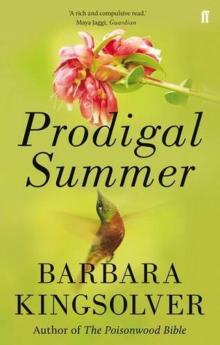 Prodigal Summer: A Novel
Prodigal Summer: A Novel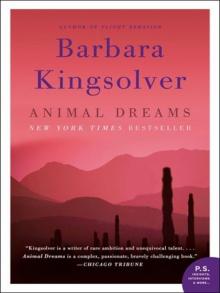 Animal Dreams: A Novel
Animal Dreams: A Novel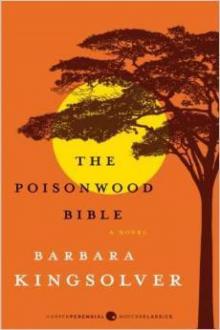 The Poisonwood Bible
The Poisonwood Bible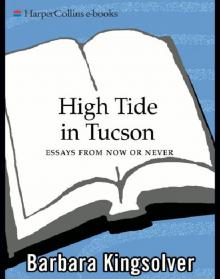 High Tide in Tucson
High Tide in Tucson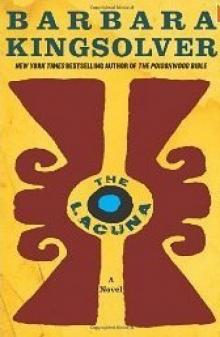 The Lacuna
The Lacuna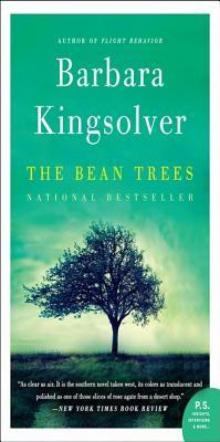 The Bean Trees
The Bean Trees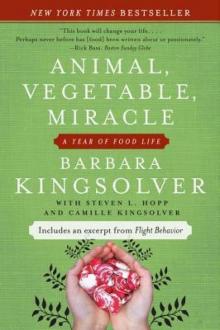 Animal, Vegetable, Miracle: A Year of Food Life
Animal, Vegetable, Miracle: A Year of Food Life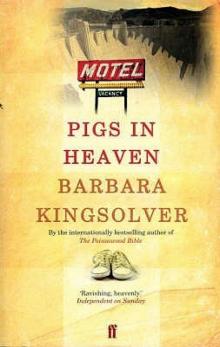 Pigs in Heaven
Pigs in Heaven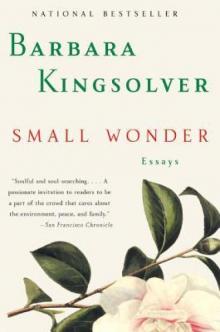 Small Wonder
Small Wonder Flight Behavior
Flight Behavior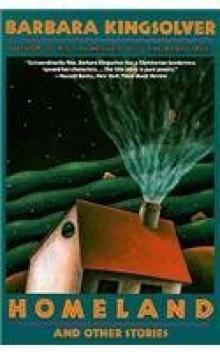 Homeland and Other Stories
Homeland and Other Stories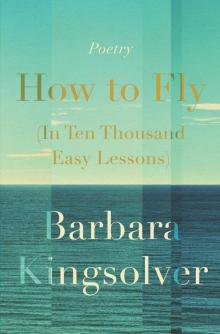 How to Fly (In Ten Thousand Easy Lessons)
How to Fly (In Ten Thousand Easy Lessons) Unsheltered
Unsheltered Animal Dreams
Animal Dreams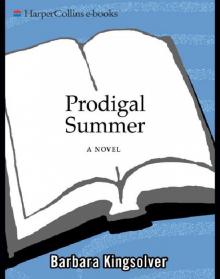 Prodigal Summer
Prodigal Summer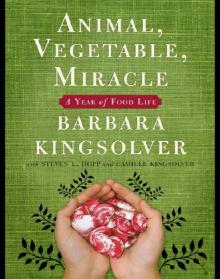 Animal, Vegetable, Miracle
Animal, Vegetable, Miracle